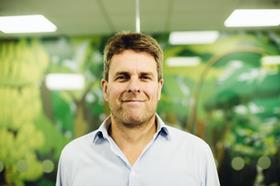
For a business with growth ambitions, bananas arguably don’t offer as much potential as other less mature categories.
But Luton-based SH Pratt Group has refused to be held back by its primary category’s high household penetration. The family-owned importer and ripener has undertaken a steady programme of investment over the past few years, including building up the transport side of the business to become a wholly-owned logistics subsidiary known as Kinship Logistics, as well as expanding ripening capacity, slashing its carbon footprint and reducing electricity use.
Now, a new venture will see the group expand its packing and service provision expertise into new product categories, with a groundbreaking new deal at deepwater port London Gateway.
Under the name Halo, the new business will pack and handle a range of new products outside of bananas, including topfruit, citrus and grapes, in what is the port’s first temperature-controlled, chilled and frozen packing facility.
It comes as London Gateway continues to attract growing numbers of shipping lines from Africa, Asia and Latin America, says the group’s founder and CEO Robert Wells, while its location close to the M25 means the site has unrivalled access to the rest of the UK, compared to other port locations.
“We wanted to build something to raise the bar in terms of handling of products,” says Wells. “Our USP will be that we are heavily involved with produce – we know how to look after fast-moving products. We’ve got a culture of running such businesses.”
The new venture is well timed in other respects outside of the port’s own development, as retailer models begin to evolve away from complete direct-to-grower models, returning some responsibility to middlemen with expertise in certain categories.
There are no immediate plans to handle bananas at the site, says Wells, who adds that it could service a range of smaller customers, or a few larger ones. With initial works taking place this summer, Halo is expected to be operational within 12 to 13 months.
Although the new company is an exciting new growth area, Wells says SH Pratt Group remains very much focused on its primary business of banana supply. Declining to put a figure on his ambition, Wells says turnover is “growing in a satisfactory way beyond what we’ve been seeing”. “We want to grow our business and we will invest to assist that. Our focus is still very much on investing in bananas and our primary business,” he explains.
With an active expansion programme, the facility in Luton now boasts 128 ripening rooms and Wells says he has an eye on where the next space will come from. After labour, electricity is the company’s biggest cost – another area of investment in the past few years.
“We’ve worked on reducing our carbon footprint and we’re now using less electricity than we were 10 years ago. We have solar panels on the roof, low-energy lighting and more efficient chillers making us one of the greenest ripening facilities in Europe,” says commercial director Simon Trewin.
One of the biggest changes in the business is that most packing is now done at source, including the company’s own SH Pratt Bananas-branded boxes, the first volumes of which arrived recently. In response, the company now has one packhouse, which caters for more bespoke orders usually from the foodservice sector.
Banana procurement has always been one of the more volatile areas of the business due to the climatic variability in producer countries. Wells says the UK banana market is primarily served by the Central American countries of Ecuador, Costa Rica and Colombia, with the former ranked as lowest risk climatically.
“Countries that are most interesting to us are those where the farmers have a mentality of working with the end customer, and the ones who pose the least risk,” he says, comparing with other growers who are more focused on a commodity-style, rather than premium, banana market.
As well as Mexico, another new contender for banana sourcing is India, with its status as largest global producer of bananas giving it strong potential despite being slightly behind the curve on size of farm and export capability.
“India has a strong Middle East market but they have the production to cope with a bit extra,” he says. “Shipping times of between 18 and 20 days means it is comparable with traditional longer routes.”
Whether it’s procurement, or new ventures, decision making at the SH Pratt Group is a short process, says Wells, who believes produce companies need to be “brave and light on their feet” to keep up with the rapidly changing markets.
With its small but focused board and a forward-thinking strategy, the company is certainly doing its bit to provide value wherever possible and secure its future in the process.
A fairer deal
Fairtrade and organic banana markets are currently in growth but typically they ebb and flow as demand changes, according to SH Pratt Group’s Robert Wells. “The new addition is Rainforest Alliance, which is seeing increasing demand across Europe,” he says. “Fairtrade in the right place works excellently. For some retailers, Rainforest Alliance works better as it has the consumer trust but with slightly different standards.”



